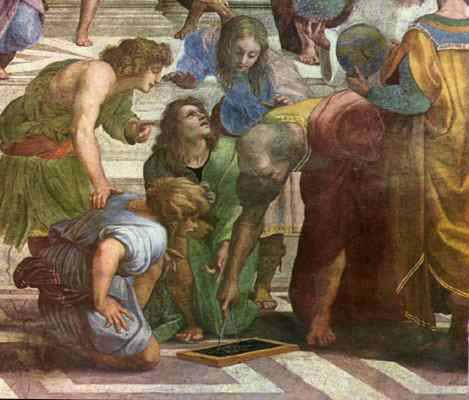Pythagoras' magic number

Fact and fiction are separated in Kitty Ferguson's account of Pythagoras. By Clare Lanigan.
World-changers don't come around very often. The world can be chugging along just fine, adjusted to whatever level of development it's at, and then someone appears from nowhere with a whole batch of new ideas and abilities that leave the world different, forever.
Whoever invented farming was one, whoever first mined metal was another. In recent years it's the genome-sequencing and Big Bang-analysing scientists who get the main credit for these kinds of changes, but their work rests on the shoulders of those who first discovered the mathematical order in nature, who, like the first miners, found something beautiful and productive in the unlikeliest of sources.
The modern world owes more to the semi-mythical mathematician Pythagoras than most of us can even begin to conceive. Lucky then that there's a recently published book that goes some way towards explaining the significance of this person (or people) in terms that even the most mathematically challenged can understand.
Science writer Kitty Ferguson has done an admirable job in presenting not just the famous theorem, but any number of mathematical concepts that seem to have been first laid down by a group of philosophers and scientists in the Greek colonies in Southern Italy in the 5th century. Her logical approach proves useful in breaking down the various different accounts of the life of Pythagoras, weighing up each account carefully for probability and plausibility.
A picture emerges of an unprecedented genius, a thinker made up of equal parts scientist and priest, who founded a long-standing cult based on the magic of numbers. This was a world where logic and mystery existed side by side, where there was little delineation between religion and daily life.
Pythagorean thinking saw fundamental patterns in the symmetry of numbers and equations, a viewpoint that strongly influenced the thinking of one Plato, who can be seen to be an inheritor of the Pythagorean tradition rather than a wholly original thinker.
Ferguson follows the Pythagorean legacy through the Roman and medieval periods, taking in a dizzying amount of information which tends towards factual overload, though she recovers pace somewhat when looking at mathematics and the 20th century.
The statements about faith versus science towards the end of the book feel tacked on and could easily have been left out. Without a doubt, the book is strongest on the Greek legacy of Pythagoras - if Ferguson ever decides to move away from science writing, a career in classics would be well within her league.
Pythagoras: His Lives and the Legacy of a Rational Universe by Kitty Ferguson
Icon Books (Hardback), August 2010
£20.00
